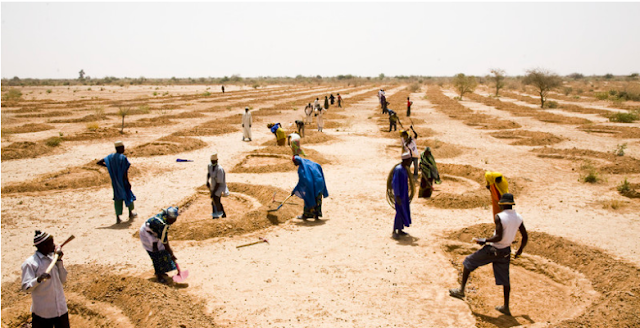Decolonising water rights: Moving forward
(Image: GETTY)
Looking last week at
techniques used by small scale farmers in Niger and Burkina Faso to regenerate
and management water and soil, has led me to researching whether this is a
viable option for other regions of Africa.
Many
African Countries rely on a nation-wide water permit system. In the colonial
era, the goal of water legislation was to establish colonial ownership of water
and land resources (Van Koppen & Schreiner 2018). The laws surrounding water and permits were rooted
in European law. A recent report published by Barbara van Koppen (International water
management institute) details how
smallholder farmers are being pushed aside due to post-colonial water laws that
restrict their access to water for agricultural use by using permits to
legitimise the use. The prevailing issue with the system is that it bias
towards large-scale water use in fields such as, mining, industry and
large-scale irrigation. Water use by farmers without a permit is criminalised,
a system put in place by colonial rulers in the 20th century.
The Financial times
recently published an article entitled ' We must decolonise water rights for
Africa to advance.' The article explains the legacies of colonialism that
restrict black South African's owning land, in relation to the report. A public
announcement of plans to reform race-based land ownership seems long overdue.
South African Disparity for small scale farmers:
These permits
reflect historical barriers to African agricultural intensification (Frankema,
2014). In South Africa, where the demographic distribution of water permits
became a vehicle for an uneven and bias system. The inequality in South
Africa's water sector can be traced back to the country's inequalities
allocation of water resources (Terawri
& Oumar, 2013). The provision of water replicated the racial
segregation patterns. The native majority in South Africa are landless.
Water rights and
land ownership are inextricably linked, as ''to be able to use water in many
parts of Africa, you need to have land.'' (Timothy Williams, IWMI’s director
for Africa).
Moving forward:
Permit systems have
equality and logistical implementing
issues (Van
Koppen & Schreiner 2018), however they are viewed as necessary for
governance of water as they allow for regulation of water use from individuals
as well as large-scale corporations. An application of a 'hybrid approach' to
water permits regulation has been suggested, this covers granting equal legal
standing of permit holders and non-permit holders, as well paying particular
attention to water users with the greatest impact on water supplies. This
hybrid system is thought to improve water access for small-hold farmers, which
will enable irrigation of small farms which is necessary in regions that rely
on rain-fall to run their farms, with droughts becoming increasingly frequent.


Thanks for the very interesting and pertinent post on water permitting. A potential follow-on post might look at the situation in Tanzania in the upper part of the Rufiji Basin (Great Ruaha Sub-Catchment) where smallholder agriculturalists have had dry-season permits closed but some international investors appear to secure water permits (or access water for irrigation) during the dry season. If interested, check out Frances Cleaver's work in the Usangu Plains: https://www.sciencedirect.com/science/article/pii/S2212608213000028
ReplyDeleteThank you for the great suggestion, I made a post on it this week!
Delete